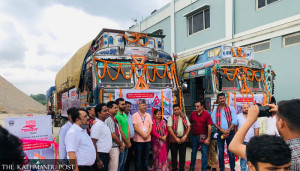Politics
Cooperatives victims announce new phase of protest as Oli claims progress
National Campaign for Protection of Cooperative Depositors announces the start of the fourth phase of agitation from November 20.
Purushottam Poudel
Prime Minister KP Sharma Oli presented his government’s 100-day report on Wednesday. While presenting his accomplishments, Oli committed to take action against cooperatives frauds and to refund the money of depositors.
As the prime minister claimed that the government was making progress in terms of creating the environment for returning the savings of cooperatives depositors, the National Campaign for Protection of Cooperative Depositors has announced the fourth phase of protest, accusing the authorities of not implementing the agreements reached with them in the past.
Alleging the government’s non-commitment to implementing its earlier promises made with the National Campaign for Protection of Cooperative Depositors, leaders of the campaign on Thursday organised a press meet in Kathmandu on Thursday where they announced to start the fourth phase of protests from November 20.
They said they would still wait for the government to implement the agreements until the deadline. The representatives of the victims claimed that the fourth phase of the protest would be a decisive one.
“Despite reaching an eight-point agreement one-and-a-half months ago, the government has not cared to address the problem since. Therefore, we planned to resume our protest,” Kusluv KC, chair of the campaign, told the Post.
“Minister for land management, cooperatives, and poverty alleviation [Balaram Adhikari]’s claim at a press conference on Wednesday that they addressed our concerns made us furious.”
The government had reached an eight-point agreement with the cooperatives victims on September 9. It was the third agreement signed between the government and the depositors who lost their savings within a year.
“Not only are cooperatives frauds being prosecuted, but initiatives are also being taken to formulate a cooperatives authority act, and establish a cooperatives credit information centre and debt recovery tribunal that are necessary to refund depositors’ money," Prime Minister Oli said, while presenting the government's progress in its 100 days in office on Wednesday.
Cooperatives victims resumed their third phase of protests on June 24, accusing the government of failing to implement agreements signed with two ministers in the past.
The victims staged the first phase of their agitation in June last year. They reached a seven-point agreement with Ranjita Shrestha, then-minister for land management, cooperatives, and poverty alleviation.
As the agreement was not implemented, they launched the second phase of agitation. On March 22 this year, they signed an eight-point agreement with Minister Adhikari.
The victims suspended their 108-day protest following the eight-point agreement of September 9 as the government reiterated its promise to return their savings.
The eight points were agreed upon after a negotiation between the representatives of the National Campaign for Protection of Cooperative Depositors and government officials in the presence of Arjun Prasad Pokharel, the secretary at the ministry.
As per the agreement, a committee was formed with the sub-registrar of the Cooperatives Department as coordinator. Its mandate was to continuously assist in collecting and analysing data to address issues, including the return of depositors’ savings.
The committee comprises representatives from the ministry and the national campaign.
The campaign chair, Kushluv KC, said Singh KC, a Kuleshwar-based Gautam Shree Cooperative victim, agreed to represent them on the committee.
“The committee agreed to monitor the inspection of crisis-ridden cooperatives, collect all the details, and categorise cooperatives,” Kushluv KC told the Post. “The committee was supposed to present its findings and recommendations to the department after analysing the collected data.”
But one and a half months after the third-phase agreement, government agencies did not seem positive about holding the meeting as agreed to solve the problem, KC blamed.
The committee agreed to conduct financial analysis of the inspected cooperatives, categorise them as well-functioning, crisis-oriented, and crisis-ridden, and recommend necessary actions.
It was also agreed that a review meeting would be held at the Ministry of Land Management on the last Sunday of every month to assess the committee’s progress. However, the cooperatives victims say no point of the agreement was implemented.
Similarly, the agreement reaffirmed the government's commitment to implementing the previous agreements made with cooperatives victims.
“The victims might have thought that the execution of the agreement means immediate receipt of money, which has not happened,” Tola Raj Upadhyaya, deputy registrar and information officer at the Department of Cooperatives, said. “But the government is seriously working to implement the agreement.”
In a separate announcement, the government had announced to return the money of small depositors in troubled cooperatives during the budget presentation. It has, however, defaulted on this pledge as well.
During the budget presentation for the fiscal year 2024-25 on May 28, the government announced a plan to refund the savings of these small depositors.
“To solve the problem in the savings and credit cooperatives, arrangements will be made to return depositers’ money up to Rs500,000 by using the property of cooperatives operators or of their immediate kin as collateral,” then-finance minister Barsha Man Pun said in his budget speech in Parliament.
The Post talked to the Ministry of Land Management, Cooperatives and Poverty Alleviation officials shortly after the budget presentation for clarification on how the refund plan would go ahead.
At the time, ministry officials had said the government policy, already endorsed by Parliament, would take effect from the start of the new fiscal year. However, five months into the new fiscal year, the government is still busy drafting guidelines to carry out the refund.
“Apart from drafting guidelines, we also are waiting for the real data on the cooperatives victims; we are yet to receive the data from the provincial and local governments,” Upadhyaya told the Post. “Once the data is obtained, the money of the victims will be returned by selling the property of the people who misappropriated cooperatives funds.”




 20.12°C Kathmandu
20.12°C Kathmandu















